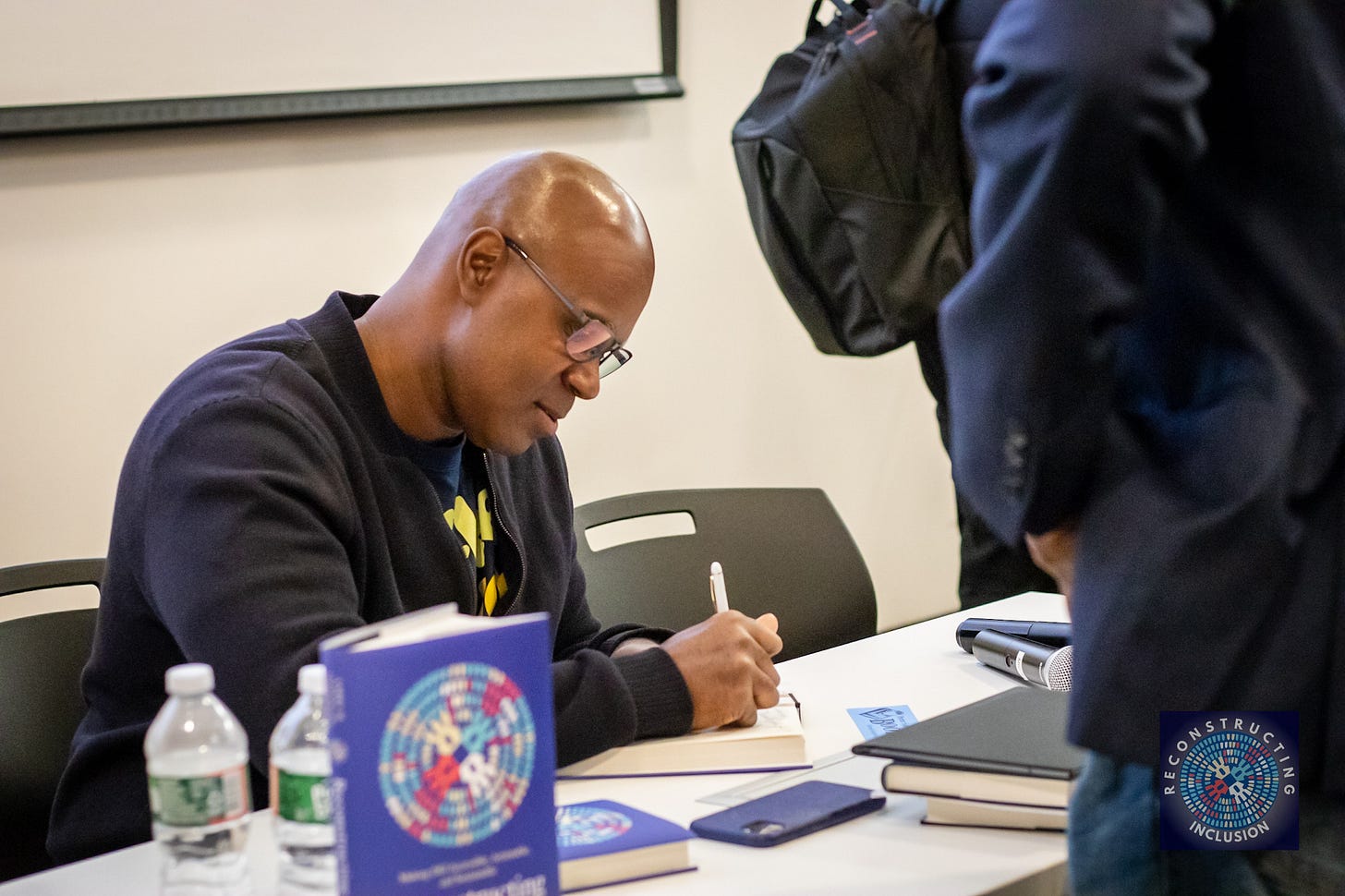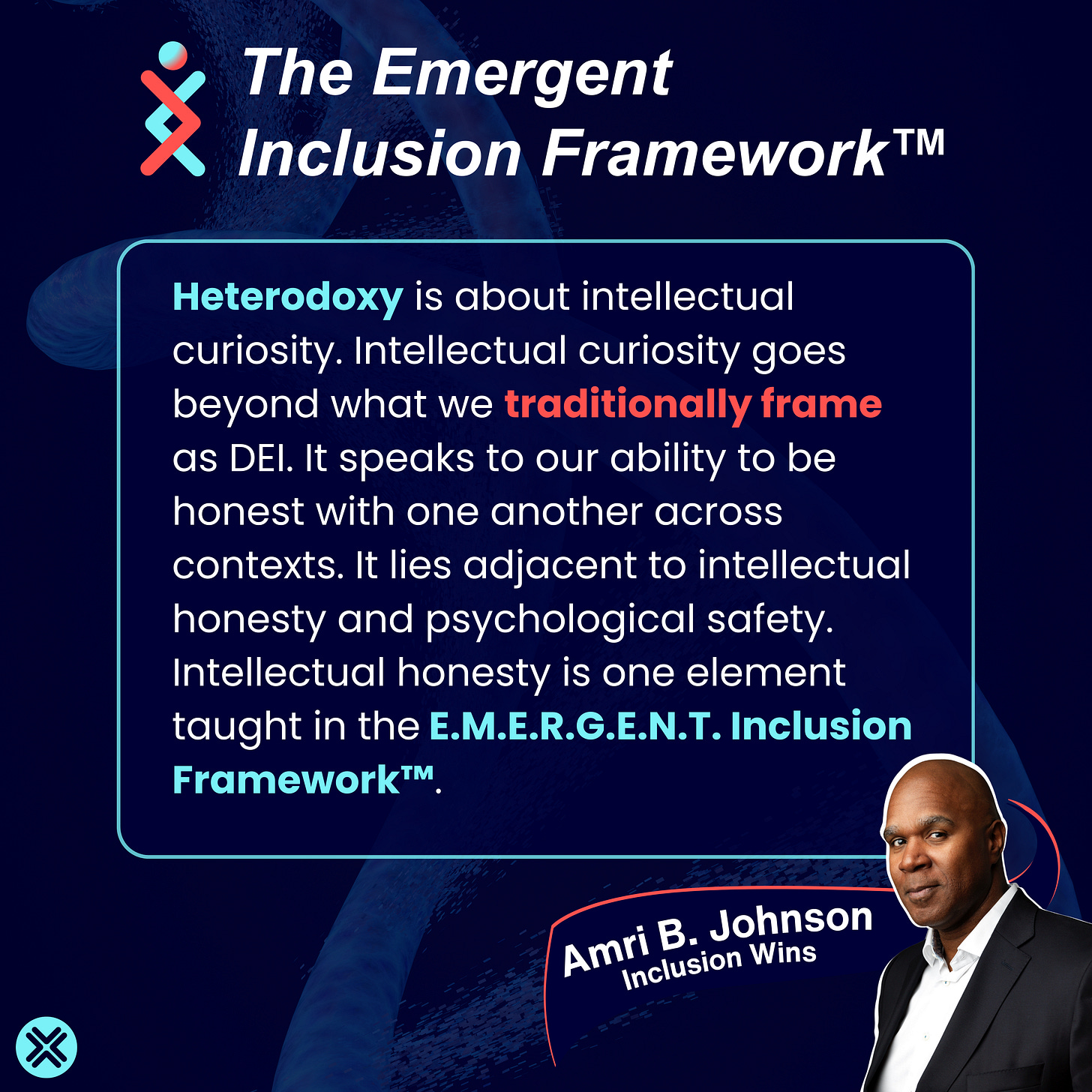Can (so-called) DEI advocates let go of the wrong paradigm?
Or, will the space be blinded by arrogance, ignorance, and the glow of past “success,” and the possible generative future be blighted?

Srini Pagidyala said in a recent post talking about LLMs that, “Giants in every era were brought down not by lack of resources, but by clinging to the wrong paradigm, blinded by arrogance, ignorance, and the glow of past success until the future passed them by.”
There is a universal truth in Pagidyala's statement. It struck me that we’ve been at this point for quite some time in the so-called DEI industry. The current state makes this unambiguously clear.
Part of my motivation in writing Reconstructing Inclusion was to challenge the often unchallenged, yet clearly unproductive, paradigms that were resurrected in 2020, suggesting that DEI = Social Justice/Antiracism/Representation of select group identities.
Here are a few things I said in my book that was published in December 2022 (while I wrote most of it over 15 months from November 2020 and January 2022).
Start with deconstruction, but don’t get caught up in the phrase.
“The journey into deconstructing DEI has, in a way, already begun through the sociopolitical and economic deconstruction that we have seen increasingly since early 2020. Over time, we have modified our approaches from diversity management to cultural competency; a more deliberate focus on inclusion, belonging, and equity, and more recently, a revisiting of social justice through anti-racism and racial equity. The list goes on.
Organizations and those who have been passionate about “the work” (a phrase often used by DEI practitioners) have changed their terminology based on their objectives, past negative connotations, and misinterpretations. In some cases, those responsible for naming their departments and offices are working to create a brand that sounds more appealing and less tied to the approaches perceived as correlated with failure to increase the representation of underrepresented, underexposed, and in some cases excluded identities across a broad range of industries and their respective institutions.
Deconstructing inclusion does not mean annihilation. To the contrary, it is an expansion beyond the structures that have often reduced certain terms and practices to effective versus ineffective, and in some cases have rendered such approaches as no longer viable in place of the preferred approach of a popular individual or ideological group. The problem with this sort of reductionism is that there is great complexity in organizations. To think that any single approach or mindset that holds potential benefit for one firm holds equal benefit for all is a gross assumption, and incomplete at best.” (p. 18)
Reconstructing Inclusion: Virtual Launch
Those who consider themselves practitioners have the utmost responsibility.
“Thus, deconstruction is something that we all must do more of. We must pull apart this field and question its parts, contexts, and meanings so that we can engage in dialogue that prepares us to respond to the inevitably greater uncertainty, ambiguity, and complexity of the future. Some of our ideas about DEI may no longer serve us. Others may need a reframing and amplification with new meaning and actions toward sustainability.
I believe that if we, as practitioners and advocates, don’t purposefully deconstruct DEI now, critics will [and have]. And the result of those critiques will fuel outcomes that are opposite of those that committed practitioners aspire to.” (p. 19)
. . .
“I am writing this book because diversity, equity, and inclusion has never been more vital for organizations. But despite this growing importance, there have been very few frameworks to advance the work beyond historical attachment to representation. Words like “belonging” and “equity” have been added to the aspirational outcomes, but the pathways to make this accessible, actionable, and sustainable have not matched the aspirations. With such enthusiasm, [this may be] our last and best chance to save DEI from death by a thousand platitudes.” (p. 20)
We have reached a critical juncture in the work of inclusion, or so-called DEI. The path forward cannot be attached to the past paradigm.
Do we maintain the DEI orthodoxy of the past and watch the space wither into a shell from its inflated time after-Floyd, or do we make the critical shift to something life-giving and sustainable?
Meaning, to recognize where the mark was missed, where the noise (rhetoric and ideological capture) drowned out the signal (consistent meaningful action and impact), where we got caught up in rightness and wrongness vs. possibility and progress–and how to get to a space where we can:
“[Pursue] a reconstructed paradigm to make inclusiveness accessible (for everyone), actionable (unambiguously prioritized), and aligned with organizational purpose. That means all [organizational contributors], no matter their identities or beliefs. We need everyone in our organizations speaking openly and taking action, adding value [to one another] and creating organizational impact using the tools and skills of inclusion.” As I share in our Elevating Your Inclusion Edge live virtual event (held monthly), to “make inclusion skills your organizational super power!” (p. 21)”
“If we [practitioners in the broadest sense of the word, from those in an inclusion role to those who believe in the power of creating the conditions for people to thrive] are consistently incisive in our exploration and inquiry, we create space for inclusion to win for everyone.” (p. 19)
When Inclusion Wins, Everyone Wins.
I hope this was helpful. Make it a great day! ✌🏼
Ready to transform inclusion from concept to action to being a cultural superpower?
When inclusion becomes "the way we do things around here," it transforms from initiative to being a key part of organizational identity.
Want to be part of this transformation? Join us for our upcoming free virtual event exploring the Emergent Inclusion Framework. Whether you're a skeptic or champion, your voice matters in this conversation.
I hope this was helpful. . . Make it a great day! ✌🏿







